At what temperature does vodka freeze? What does this indicator mean? Beer is frozen in the refrigerator - is it safe to drink?
It is a known fact that beer freezes instantly in the cold. Its freezing temperature depends on two main components. Let's figure out which ones exactly.
1 How does freezing beer affect its taste?
Water turns into ice at 0°C. Every schoolchild knows this law of physics. Beer begins to freeze at a lower temperature, the reason for this is the content of extract and alcohol in it. The beer bottle label always contains this information.
The content of the extract expresses its density; on the primary packaging it is indicated by the inscription “extractivity of the initial wort”. This indicator depends on the type of beer and its alcohol content. In light light varieties, the extract content of the initial wort is 11-13%, in dark and strong varieties it is 12-20%, and in soft drinks it does not exceed 5%. An equally important indicator is the strength of beer, which shows the alcohol content in finished product and is expressed in percentage or in the volume fraction of alcohol - revolutions. This indicator can also be found on the manufacturer's label.
Beer with the most common density and strength indicators freezes at a temperature of - 2.3 ° C (initial wort extractivity 11.5%, alcohol content 4.6 vol.) and - 2.9 ° C (initial wort extractivity 15.5%, alcohol content alcohol 6.0 vol.).
The strongest and most frost-resistant beer in the world with an alcohol content of 67.5% is called “Snake Venom”. To create such a strong drink, brewers had to work hard, freezing and thawing it 15 times. The price of one bottle of Snake Venom beer in the USA is $81.
How exactly does this drink freeze? When the air temperature drops below 0°C, the water in the beer gradually turns into pieces of ice. If the temperature drops even lower, then insoluble substances, proteins and polyphenols, which enrich the alcohol with extractive substances, are frozen. Thus, the constituent parts of beer do not freeze at the same time.
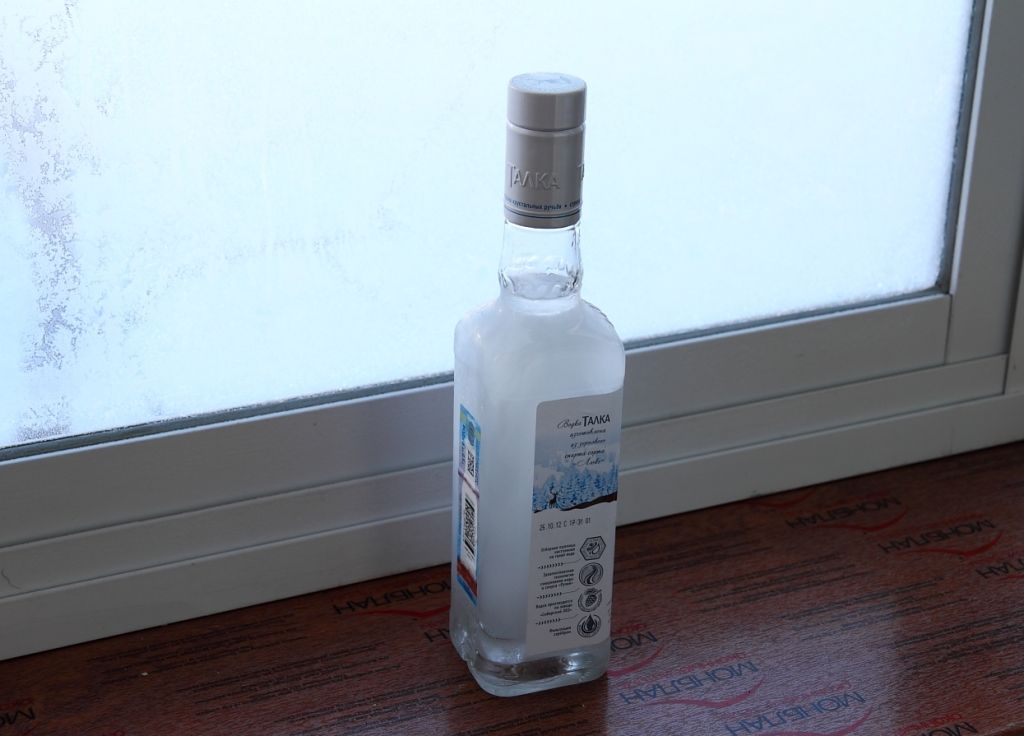
Is freezing a drink good or bad? Many foodies will answer you differently. In Australia and America, they believe that ideal beer must be stored at freezing temperatures. Conservative Englishmen are of the opinion that it is better to store and serve it at room temperature, and the Germans - at 7-9 °C. The rest of the world's gourmets remain neutral.
How many people, so many opinions. However, brewers say that if beer drinks are cooled too much or even frozen and then heated, they will quickly deteriorate and lose their taste and hop aroma. Cloudiness indicates hypothermia, but if you put the drink in a warm place for a short time, the cloudiness will disappear after a while. Hops that were previously frozen, as well as very cold beer, practically do not form a “foamy head” when poured into a glass. And too warm alcohol forms a lot of foam, giving off a stale smell and a dubious taste.
Previously, “ice” beer was produced in the following way. A barrel with the Bokbier variety was placed in a special bath with a salt solution, and in the cold season it was simply left in the yard overnight. The inside walls of the barrel were covered with a thick layer of ice, but the drink itself, although significantly cloudy, still remained strong. It tasted unusually good, but the technology for its production was imperfect. Due to the high internal pressure, due to the rapid freezing of water, the corks easily flew out of the barrels.
For mass production of "ice" beer, this method is unreliable. Brewers came to the conclusion that to eliminate errors, it was necessary to keep the beer in constant motion during production to avoid ice accumulation in one place. When small ice crystals coalesce into larger fractions, they can be easily separated through the filtration process. After production is completed, such beer contains large number alcohol, and thanks to purification from polyphenols and proteins it acquires mild taste. “Ice” beer has a number of advantages: it has a fairly low freezing point for beer (down to -5 ° C), stable foam and density.
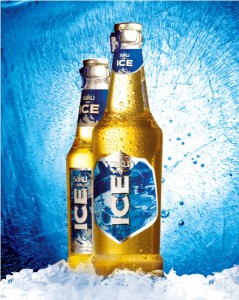
3 Famous trick with freezing beer - surprising friends
Do you want to surprise your friends and family with an unusual technique for freezing beer? Then try the next trick. Take a few clear glass beer bottles and put them in the freezer. Cool the drink, but make sure it remains liquid. Once the beer is as cold as possible, but not frozen, take it out and place it on a hard surface. Raise the bottle 5 cm above the selected surface and lightly hit it. You will see how bubbles begin to appear in the chilled drink, gradually filling the entire space of the bottle and turning the intoxicating liquid into ice. This spectacular process takes about ten seconds.
If you were unable to achieve this result, it means that the beer was not chilled enough. Place the bottle back in the freezer and try again later.
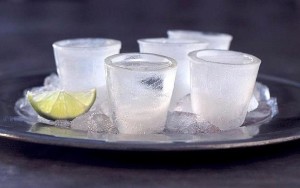
Surely many are interested in the question - how does it work? The answer lies in hypothermia. The temperature in the freezer is significantly lower than the freezing point of the foamy drink, but it does not freeze due to the fact that the inside of the bottle has a smooth surface that prevents the formation of ice crystals. Thus, the beer becomes slightly supercooled, but not frozen. When the bottle hits the surface, bubbles are formed, which, “catching” on each other, form ice crystals.
And a little about secrets...
Have you ever experienced unbearable joint pain? And you know firsthand what it is:
- inability to move easily and comfortably;
- discomfort when going up and down stairs;
- unpleasant crunching, clicking not of your own accord;
- pain during or after exercise;
- inflammation in the joints and swelling;
- unreasonable and sometimes unbearable aching pain in the joints...
Now answer the question: are you satisfied with this? Can such pain be tolerated? How much money have you already wasted on ineffective treatment? That's right - it's time to end this! Do you agree? That is why we decided to publish an exclusive interview with Professor Dikul, in which he revealed the secrets of getting rid of joint pain, arthritis and arthrosis.
Many people have at least once wondered at what temperature vodka freezes. This is a completely healthy interest. After all, each liquid has its own freezing point, and how high it is depends on chemical properties and the molecules that make up it.
Alcohol and vodka
Everyone knows that it contains alcohol. However, if you take it in its pure form, you can freeze it only at a very low temperature, namely at -115 degrees. Because it is not found anywhere on Earth, alcohol is used as an anti-icing fluid and also as an antifreeze. However, at what temperature does vodka freeze? In order for this alcoholic drink to freeze, you only need -29 degrees. Although sometimes it is less - about -25, it all depends on how high-quality the alcohol was used. By the way, it is worth noting that freezing vodka is an excellent method of checking its quality. What's the point? If vodka freezes at a temperature of -20 degrees, then this poor quality product. In common parlance, such a drink is called “scorched” - that is, it is a vodka surrogate created in the wrong conditions from poor raw materials. Thus, knowing at what temperature vodka freezes, you can prevent And such cases, unfortunately, are quite common.
Freezing Celsius
So, it has already been said at what degrees vodka freezes. An ice crust begins to form when the temperature drops below -27°C. But at what temperature does vodka freeze completely? The final freezing of the drink occurs at approximately -35°C. Others alcoholic drinks freeze at a much “warmer” temperature. For example, beer will freeze at -3 degrees, but wine will crust if freezer it will be around -12°C.
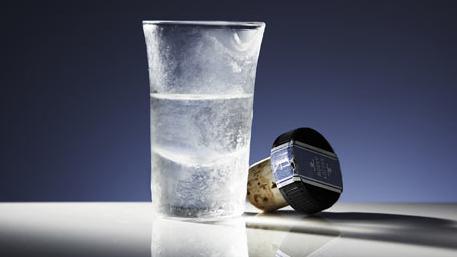
Cooling process
Many people believe that vodka is much better to drink when it's out of the cold. In order for the drink to cool faster, it is even placed not only in the refrigerator, but in the freezer. The main thing here is not to overdo it, otherwise you will have to defrost the bitter later. So you need to cool the bottle wisely. In a regular freezer maximum temperature usually does not exceed -24 degrees. So, if the vodka is of high quality, it should not freeze to the state of an icy slurry. In order to avoid this altogether, you can simply place the bottle on the top shelf of the refrigerator, closer to the far wall - the temperature there is usually lower. If it is winter outside and frost of more than -25 degrees is not expected, then you can safely leave the vodka on the balcony or “overboard”. In general, experts advise drinking vodka that has cooled to +8 degrees. They claim that it is at this temperature that the drink reveals its true smell and taste. In addition, drinking this vodka is much easier and more pleasant - there is no strong aroma, and after taking a sip there is no desire to overpower the taste a huge amount juice However, you shouldn’t overcool it either. Firstly, vodka will lose some of its properties, and you can catch a cold - after all, this drink is drunk in one gulp.
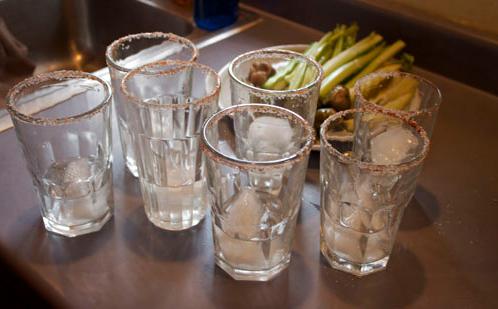
Degrees and strength
Alcohol and vodka are related liquids. However, why is their strength different, just like the freezing temperature? The fact is that vodka is produced by distilling alcohol through wort. Its standard composition is wheat, rye, oats, barley, buckwheat, peas and corn. The alcohol is also diluted with water purified in several stages, which in itself affects the reduction in the strength of the drink. And finally, the vodka is filtered through activated carbon. If everything is done correctly and under appropriate conditions, the result is a high-quality alcoholic drink with a strength of 40 degrees. By the way, there is another way to check how good this or that vodka is. You need to set it on fire, just preheat it to room temperature. If the flame has a green tint, then you should not drink the drink - there is too much of it and you can get poisoned.
no..I’m hot..I’m sitting in shorts and a T-shirt and eating ice cream...I don’t remember when I felt last time It was cold :)))) my body is like that :)))
There is a condition when there is severe stress... the so-called cold sweat, when you seem to be shaking from the cold, but you are all wet
This means the depth of the well is more than half a meter. Ground temperature +4 degrees. “warm” water rises and prevents it from freezing on the surface.
if I meet a coachman I know, and even if I don’t know him, I’ll still ask if he freezes when he’s sober...
Do you know what my childhood dream is? To build the largest and best rehabilitation center for animals......as a child, this dream warmed me, but now I understand that it is practically impossible to fulfill it......The topic of animals is the most relevant for me, and at the same time sick at the same time.....My boyfriend, when we just started dating, was afraid to rent an apartment because he claimed that all the animals I met on my way would live with us........Damn, I had to grow up... .sometimes pretend that everything is ok, and look away from his eyes full of tears, although he knows anyway... But I can say with confidence that I will not pass by a dying animal, no matter what the cost.... Many people say that this is stupid, perhaps... but it is.
40% -28.9C.
56% -36C.
Yes, you don’t need to freeze it, but drink it))
Don't blink, they'll freeze!
In winter, it is best to fill the engine with synthetic oil marked 0W30, 0W40 or 5W40. You can use slightly less frost-resistant, but cheaper semi-synthetic or hydrocracking oil 5W40. Inexpensive mineral oils 10W40, 15W40 and others are optimal for spring, summer and early autumn.
It's not that simple. The water-ethyl solution has no exact point freezing. The ice from the water begins to freeze. The alcohol level in the remaining solution increases. The freezing point of the solution will already be lower.. And in this way it will reach the freezing point of pure alcohol. A hundred and something there..
There is a way to purify moonshine - freezing. Water with all sorts of impurities freezes, and the alcohol is poured off. Only it freezes not in pieces, but in ice porridge.
40-degree temperatures begin to thicken somewhere around -27 degrees. Maybe earlier. Depends on the presence of freezing catalysts in the bottle. Around which ice will freeze. Dye for example... all sorts of impurities.
Not long ago I purchased a large quantity of beer for an upcoming party. It was quite cool outside, as the first frosts had begun, there was occasional snow, and the wind was getting colder every day. The overall temperature outside the window during the day remained at 0˚C and corresponded to the freezing temperature of water.
I purchased about fifty liters of draft. It was poured into plastic containers directly from the tank on. The celebration was supposed to take place only the next day, and when I drove up to the house, I was faced with a choice:
- dragging everything I bought into the house, which I didn’t want to do at all;
- or leave it in the car overnight, but there are certain risks with the fact that it can freeze, which means losing many of its quality characteristics.
It should be noted that the inside of a car is always a little warmer than outside. open space. As the outside temperature decreases, this value is leveled out, unless the car is warmed up. However, at ambient temperatures down to -2˚C, the temperature in the cabin will be around zero.
Knowing this, I checked the weather forecast for the coming night and, taking into account certain risks, decided to leave the beer in the car.
But the question of the freezing temperature of beer haunted me, and I decided to understand the nuances. I clearly publish my conclusions in this article.
Unfortunately, it is impossible to give absolutely accurate values, since they will differ for each type of beer. The point is that beer is not a binary solution of water and ethyl alcohol. It contains a sufficient amount of other substances, including proteins, carbohydrates, carbon dioxide, many mineral trace elements and even vitamins. Total dissolved solids range from 3.7 to 5.1% for standard grades. Besides, unfiltered beer contains yeast in significant quantities.
Of course, each microelement influences the overall freezing temperature in its own way, but it is impossible to take these values into account. I think that the exact freezing temperature of each individual type of beer can only be determined experimentally.
However, if you rely solely on the components of the drink such as water and alcohol, you can draw fairly accurate conclusions. I found a table with exact values dependence of the freezing temperature of a liquid on the ethyl alcohol content in it.
Thermophysical properties of aqueous solutions of ethanol.
| Alcohol content, % | Liquid freezing point, ˚C |
| 2,50 | −1,00 |
| 4,80 | −2,00 |
| 6,80 | −3,00 |
| 11,3 | −5,00 |
| 13,8 | −6,10 |
| 16,4 | −7,50 |
| 17,5 | −8,70 |
| 18,8 | −9,40 |
| 20,3 | −10,6 |
| 22,1 | −12,2 |
| 24,2 | −14,0 |
| 26,7 | −16,0 |
The table, unfortunately, does not indicate intermediate values typical for many varieties, therefore, based on the above data, I built a visual graph of the dependence of the freezing point of beer on its alcohol content. The graph shows that the most common in Russia, with a strength of 4.5%, freezes at a temperature of about -2˚C.
As I said above, It is no longer possible to restore the former taste of beer that was once frozen. When leaving beer in the freezer for a long time, remember that a glass bottle can burst and a beer can can explode. In most cases, of course, this does not happen, the bottles remain intact, filled to the brim with ice, the aluminum cans swell, the ice squeezes out the bottom and front of the can.
Even a child knows that water freezes at a temperature of 0 degrees. But not everyone is aware of this. Therefore, let’s figure out at what temperature vodka freezes, and various alcoholic drinks freeze and why.
Do strong alcoholic drinks freeze?
You should start with strong alcohol. Many people mistakenly read that 96 degree alcohol does not harden and few have seen frozen vodka with their own eyes.
But we must admit that vodka freezes, like any other liquid on earth. Clean ethanol hardens at a temperature of 80–115 degrees.
But vodka, as you know, diluted with water and saturated with various flavor enhancers hardens at a higher temperature.
How vodka freezes
 To begin the crystallization process of water-alcohol-based vodka, a temperature of 27-30 degrees is required. In the freezer, the temperature varies from -5 to -25 degrees. Therefore, it is not possible to freeze vodka in the refrigerator. But it happens that vodka, left in the freezer, thickens and ice forms in it. This does not mean that the temperature in the freezer rose above -30 degrees.
To begin the crystallization process of water-alcohol-based vodka, a temperature of 27-30 degrees is required. In the freezer, the temperature varies from -5 to -25 degrees. Therefore, it is not possible to freeze vodka in the refrigerator. But it happens that vodka, left in the freezer, thickens and ice forms in it. This does not mean that the temperature in the freezer rose above -30 degrees.
In fact, the bottle contained not 40% product, but, for example, 35%. That is, the lower the concentration of ethyl alcohol, the higher the crystallization temperature will be. The same applies to the rest. Put 96 degree alcohol in the freezer and it will remain the same even after 10 years.
The freezing process is quite complex. Vodka does not turn into ice immediately after the temperature drops. First, it turns into a thick jelly, and only then the crystallization process begins. Vodka does not freeze into a single piece of ice; most often it freezes in separate plates. This is because the ethanol concentration level increases and freezing occurs unevenly.
Should you drink frozen vodka?
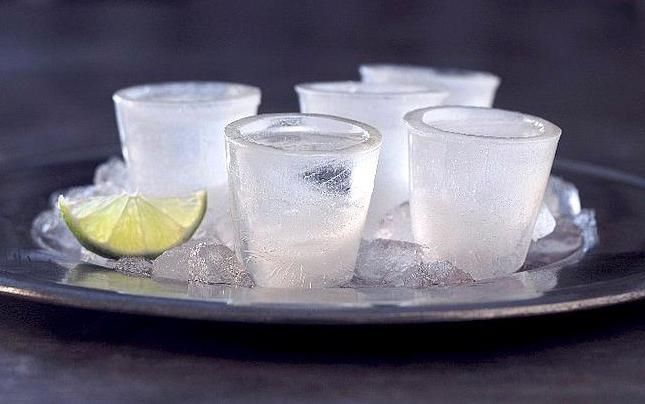 Many people are wondering whether it is possible to drink frozen vodka. In essence, this is not prohibited, but there are some subtleties. First of all, if the vodka hardens easily and quickly, this means that it is diluted and likely contains various impurities and additives. And drinking such a drink can be dangerous to health.
Many people are wondering whether it is possible to drink frozen vodka. In essence, this is not prohibited, but there are some subtleties. First of all, if the vodka hardens easily and quickly, this means that it is diluted and likely contains various impurities and additives. And drinking such a drink can be dangerous to health.
Some people check the presence of alcohol by how the contents of a vodka bottle burn. Others try to find out the quality of the product by placing the bottle in the freezer. If it cools quickly and ice begins to appear inside the bottle, then the product does not inspire confidence. In addition, frozen, thick vodka has no taste or smell. It is very easy to drink, there are no unpleasant sensations. Therefore, it is possible to drink a lot of it. But at the same time alcohol intoxication will also come very quickly. This frozen drink should be consumed carefully and in moderation.
Does beer freeze?
Beer also contains an ethyl alcohol product. At what degrees will it freeze? The freezing point of this drink ranges from -2 to -3 degrees. That is, in the freezer the beer will harden very quickly and easily. At the beginning of the crystallization process, water first solidifies in beer and gradually turns into ice. Beer becomes like a drink with pulp. After a certain time, ethyl alcohol also solidifies, it all depends on its concentration in the beer. That is, the beer does not freeze all at once, it happens gradually.
Many people argue whether it is possible to drink beer that has frozen and thawed again. There is no answer to this question, since all people have different tastes. In many countries, beer lovers prefer to drink frozen beer. And someone has warm beer. However, drinking slightly chilled beer is still considered optimal.
 There is an opinion that beer that has been frozen and then thawed loses its taste, becomes cloudy and has a bad smell. This is not 96 degree alcohol, which will not lose its taste. Fermentation processes stop. Beer is not what it should be. It is up to everyone to decide whether to drink or not to drink such a drink. All low-alcohol drinks, such as wine, cocktails, vermouth, and so on, are frozen using the same principle.
There is an opinion that beer that has been frozen and then thawed loses its taste, becomes cloudy and has a bad smell. This is not 96 degree alcohol, which will not lose its taste. Fermentation processes stop. Beer is not what it should be. It is up to everyone to decide whether to drink or not to drink such a drink. All low-alcohol drinks, such as wine, cocktails, vermouth, and so on, are frozen using the same principle.
You should not experiment and freeze alcohol. It is enough to slightly cool the drink and drink it in pleasant company. The most important thing is not to abuse it, as alcohol can ruin not only your mood, but also your health for life.









